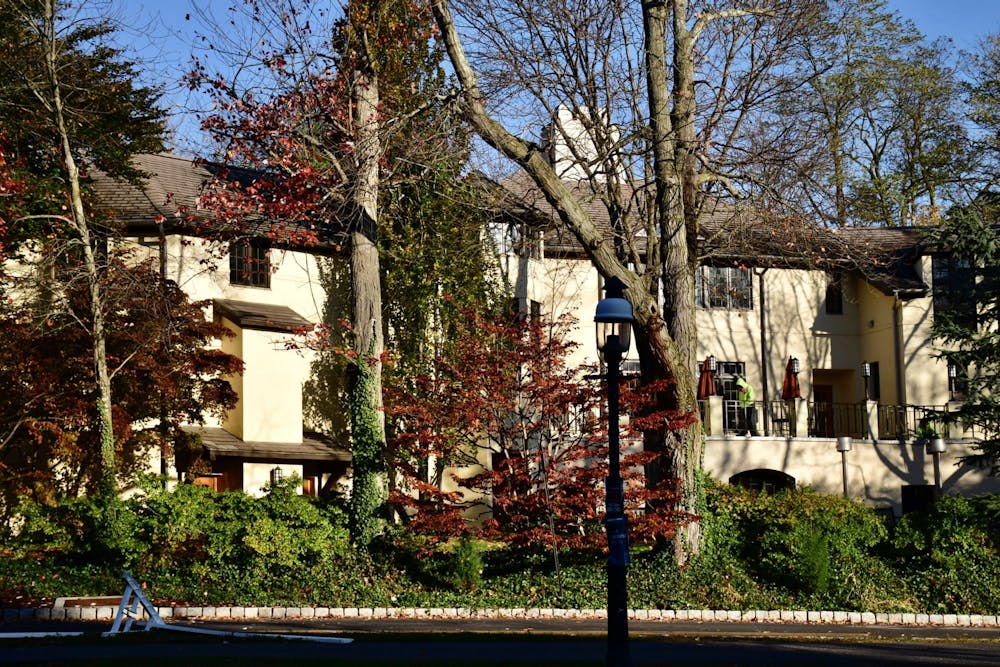The following is a guest contribution and reflects the author’s views alone. For information on how to submit a piece to the Opinion section, click here.
In the spring of 2023, when Palestinian writer Mohammed El-Kurd came to campus, Center for Jewish Life Executive Director Rabbi Gil Steinlauf ’91 expressed concerns about the event and asked the English Department to reconsider inviting him — “repeatedly” relaying his “disappointment” to the department and implying that there were other speakers he might not object to. This was the beginning of a troubling pattern.
Later that year, Steinlauf was among the voices working towards the removal of the book “The Right to Maim,” from the syllabus of an undergraduate course because it was critical of Israeli war crimes.
This Tuesday, Steinlauf “raised serious concerns” related to Friday’s academic conference about the history of Zionist and anti-Zionist thought, co-sponsored by the Departments of African American Studies and Comparative Literature, as well as the University Center for Human Values and the Humanities Council. Steinlauf wrote that the conference’s critical “approach to Zionism” will be one that “strikes at the heart of Jewish identity for many” and called for “accountability to the Princeton Jewish community.”
Steinlauf is yet again singling out an academic event for its critical disposition towards Israel, an infringement of free speech and academic freedom. But this time, the stakes are different.
Also on Tuesday, the Trump administration suspended $210 million in Princeton research funding because of a pending Title VI investigation alleging antisemitism on campus. This inquiry began more than a year ago, when Zachary Marschall, a right-wing journalist with no University affiliation, first filed a complaint to the Department of Education.
Marschall’s complaint alleged that student activists, like myself, who called Israel an apartheid state were using “violent words” that rendered the campus unsafe for Jewish students. This is despite the fact that human rights organizations led by Israeli Jews, like B’Tselem and Yesh Din, consider their own country to be an apartheid state.
This weaponization of antisemitism is cut from the same cloth as Steinlauf’s repeated rhetoric against legitimate academic events that are critical of Israel. The CJL’s hyperbolic rhetoric over recent years has thus helped pave the way for the Marschall complaint, and accordingly, the Trump funding freeze.
We see this acutely in the attacks on academic departments at Columbia. While the Trump administration seeks to defund specific areas of research, we also know from Columbia’s example that these cuts are part of a much larger strategy attacking institutions of higher education. At Columbia, funding suspensions were used as leverage for the administration to be pressured into further decimating students’ rights and the work of departmental fields and centers.
Those demands — threatening University affiliates’ first-amendment rights and placing its Middle Eastern, South Asian, and African Studies Department under “academic receivership”— were legitimized by the right-wing weaponization of antisemitism. The funding was suspended in order to force Columbia to restrict affiliates’ civil liberties and academic freedom all in the name of protecting Jewish students.
This is what makes Steinlauf’s email so dangerous. He singles out an academic conference and two specific departments — African American Studies and Comparative Literature — that he paints as threatening Jewish students’ safety, targeting exactly the kind of departments the Trump administration is suppressing at Columbia.
Neither Steinlauf, nor Marschall’s assessments, are grounded in the reality of Jewish students’ experiences at Princeton. As a Jew, I have generally found this campus to be a very safe place, a sentiment that is shared by many peers to my right politically. In fact, the only time I have ever faced a violent attack was at the hands of a fellow Jew who harassed me for calling for a cease-fire in Gaza. The only other instances where I was made to feel unsafe are from threatening emails sent by my co-religionists for calling out Israel’s war crimes in Gaza. I am certainly not threatened by an academic conference discussing the history of Zionism and Anti-Zionism.

Perhaps Steinlauf knows this. When it is convenient for him, he has publicly vouched for the safety and support of Jewish students at Princeton. No matter the case, Steinlauf is speaking out of both sides of his mouth: Within the same day he has proclaimed that Princeton is a safe place for Jews and portrayed an academic conference as a serious threat.
He cannot have it both ways. His changing tone reflects how leaders of mainstream Jewish institutional life are grasping at straws, desperate to keep the right-wing donors who have become increasingly vocal over the past 18 months satisfied. But whether this email was pandering to right-wing donors or something else, this is no longer an abstract issue for our own University.
Steinlauf must choose: Support free expression and debate within the academic community or continue to spread hyperbolic anti-free-speech rhetoric claiming to be in the service of Jewish safety. The latter actively endangers the former.
As the leader of an organization who claims to align with Princeton’s research and truth-seeking mission, Steinlauf’s capitulation to the anti-free speech right harms this University and all marginalized communities, including, of course, the Jewish community he serves.
Emanuelle Sippy is a senior from Lexington, Ky. She is outgoing President of the Alliance of Jewish Progressives.
Editor’s note: This piece has been updated to clarify Steinlauf’s communications with the English Department about Mohammed El-Kurd.








